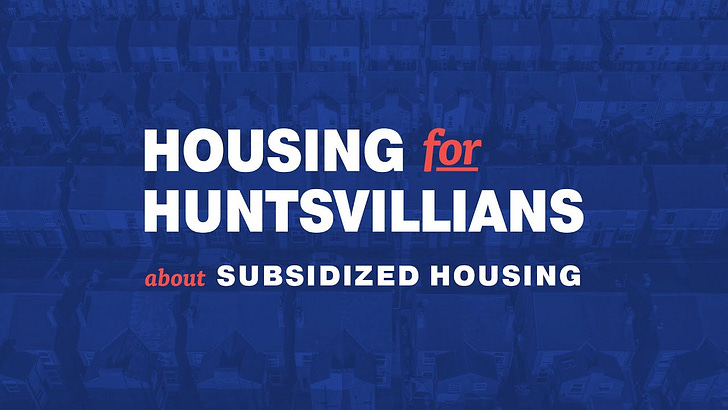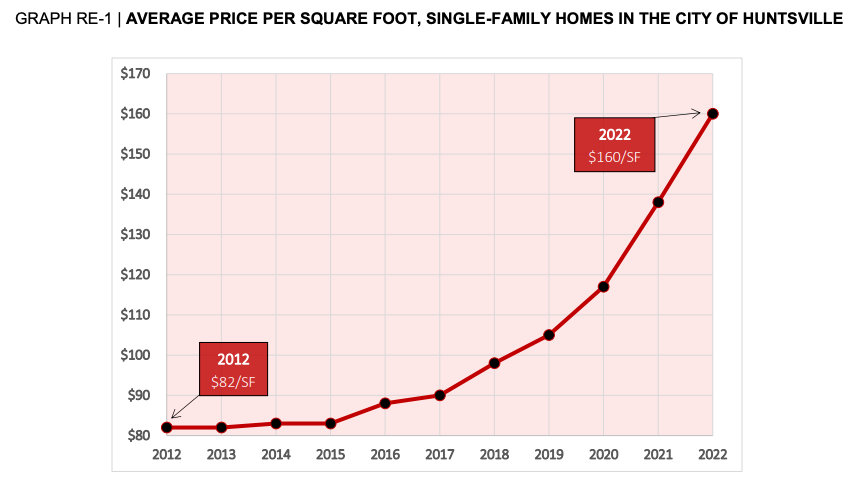Below is my op-ed upon which I based this week’s episode of the Housing for Huntsvillians Podcast!
***
On September 28th, the Huntsville City Council will vote on the budget for the upcoming fiscal year. In a recent interview, District 5 Representative and Council President John Meredith told AL.com he’d like to direct some of the budget toward building affordable housing in District 5.
Meredith is absolutely right that District 5 desperately needs more affordable housing, as does every district in Huntsville. But rather than subsidizing landlords and developers, I’d much rather see the City lower average rents by legalizing dense, naturally affordable housing throughout District 5 while subsidizing low-income families directly.
The rent is too dang high
“It’s no secret that a certain percentage of folks that work in the city of Huntsville cannot afford to live in the city of Huntsville, rents are just going up and through the roof, and when you look at the average income of Huntsvillians, housing is not affordable,” Meredith told AL.com.
Meredith is absolutely right. Over the past decade, Huntsville’s housing costs have skyrocketed while most families’ paychecks have risen far slower, if at all.
Source: Huntsville Development Review 2022
Housing eats up more of the average family’s paycheck than anything else. High housing costs create poverty and homelessness, which are expensive problems. In August 2023, Mandy Kilgore found that affordable housing was the United Way 211 help line’s number-one request for the past year, comprising 26% of calls. Of those asking for affordable housing, 64% were currently on the verge of losing their homes.
The evidence is strong that lowering housing costs should be the City of Huntsville’s number-one priority for improving quality-of-life for middle-class and low-income Huntsvillians.
Our laws are the reason
So how did housing get so unaffordable in our city?
The consensus among researchers from the Furman Center to the Greater London Authority to the National Bureau of Economic Research is that average housing prices rise when demand grows faster than supply and fall when the opposite occurs.
Huntsville is no exception.
According to Huntsville Development Review reports, Huntsville added 56,371 new residents between 2000-2020. But we only added 26,488 new units of housing. Perhaps not shockingly, rents skyrocketed as demand far outpaced supply.
The best way to make housing affordable
The only way to lower average housing costs is to build homes faster than we import new residents.
Meredith is proposing that Huntsville buy land and sell it to developers at reduced prices to incentivize them to build more affordable housing.
But developers don’t need an incentive to build more affordable housing. Building housing people can afford is their entire business model.
So why are they only building apartments most of us can’t afford?
First, because our city government mandates expensive, environmentally unsustainable sprawl. In 1963, the City implemented an exclusionary zoning ordinance that banned dense, naturally affordable housing in more than 85% of Huntsville. Even where it’s legal to build multi-family homes, our building code and planning process raise the cost of all housing. Our zoning, code, and permitting laws make it illegal for developers to build enough total units to meet demand and artificially raise the cost of each new unit.
Second, because for-profit developers who aren’t allowed to serve everyone are going to serve high-income families first.
Taxing residents to subsidize developers under our current zoning and building laws is neither efficient nor fair. We can solve our affordable housing shortage more efficiently, effectively, and fairly by legalizing dense, naturally affordable housing throughout the city. This will lower the average cost of housing overall, first. It also means developers, rather than taxpayers, take on the risks and costs of building homes everyone can afford.
Even with lower average housing costs, there will be families who can’t afford market-rate housing. For those families, the evidence is extremely strong that subsidizing families works far better, with fewer unintended consequences, than subsidizing developers.
A recent article in Vox covered some of the recent research on giving families cash. The evidence shows consistent positive effects and little-to-no negative impacts.
Cash assistance tends to increase happiness, health, school attendance, and trust in social institutions. It reduces crime and rates of homelessness.
Recipients generally spend the money on necessities like food, clothes, and utility bills and not on “temptation goods” like alcohol, drugs, and tobacco. And cash transfers do not draw people experiencing homelessness into a given state.
In many cases, cash transfers actually pay for themselves because the problems they ameliorate are so expensive.
For these reasons and more, HUD is testing a program to fund the renter rather than the developer or landlord. Canada, France, Germany, Denmark, Sweden, Norway, UK, Taiwan, Australia, and New Zealand already offer cash assistance to low-income families.
The City should repeal the laws that increase housing prices before directing dollars that could go to better uses to build unnecessarily, artificially expensive housing. And then city officials should fund families, not developers.
That’s what evidence-based, pragmatic, compassionate policy looks like. It’s what we should all demand.






That's a slam dunk!